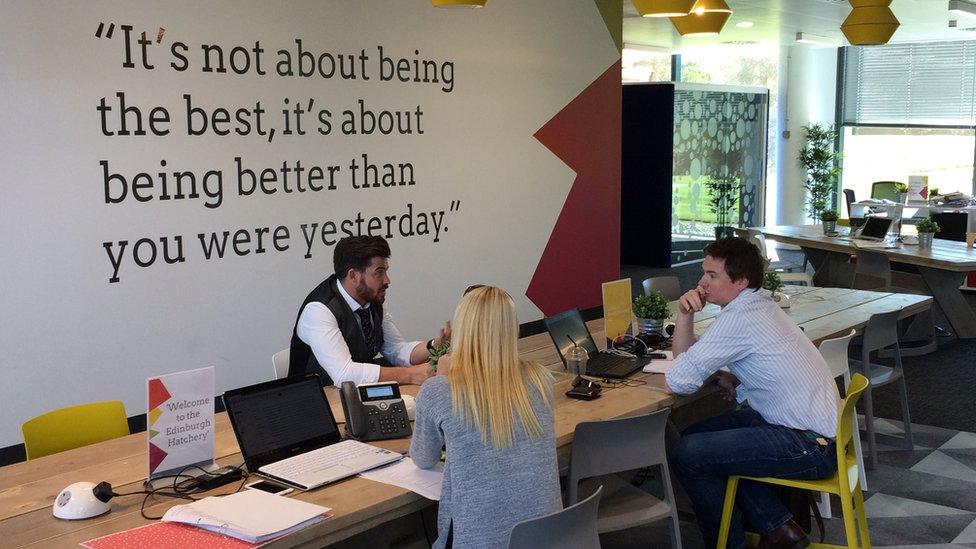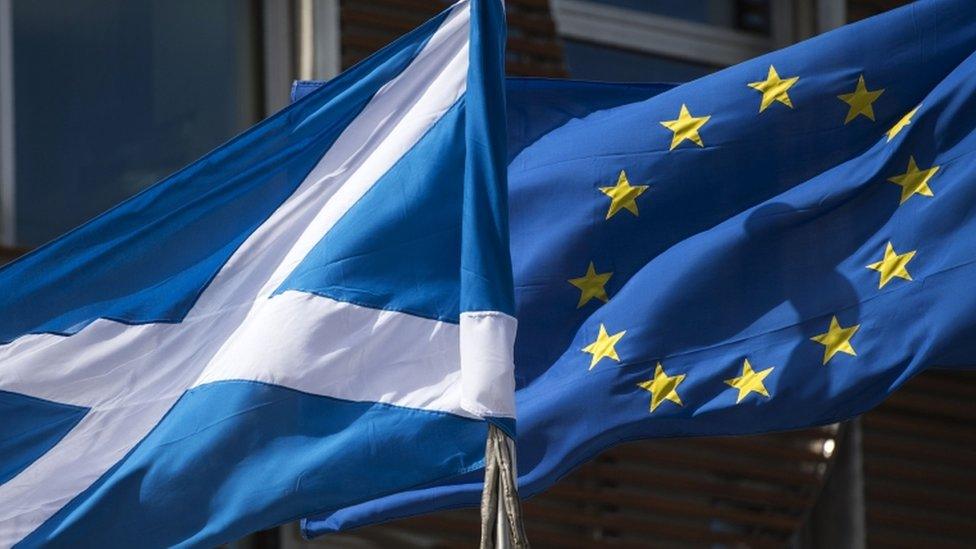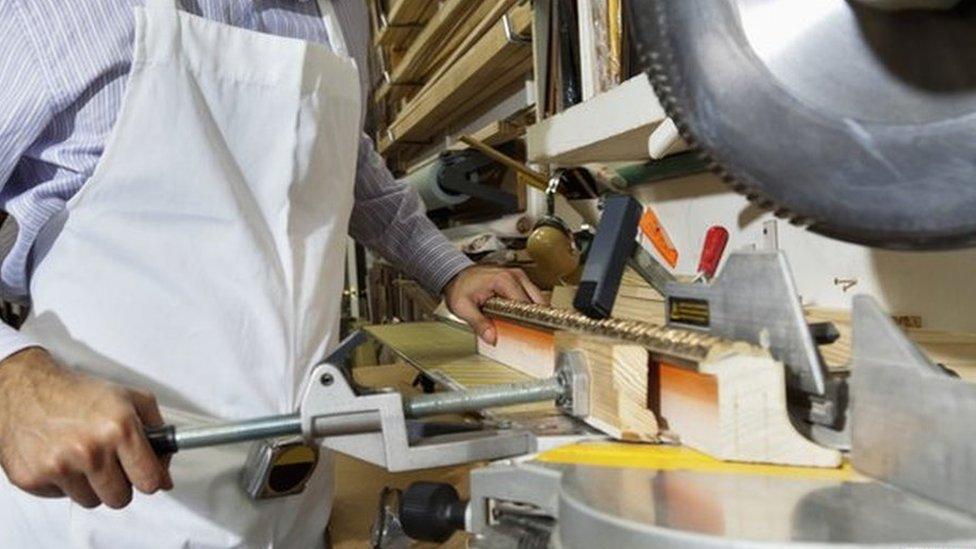Jock Shock
- Published

What does Scotland's economy most need at the moment? A great big shock, suggests Robert Crawford, former chief executive of Scottish Enterprise.
It is 13 years since he quit the top position in developing Scotland's economy, scunnered by the attacks on his organisation and him personally.
Now, with the perspective of also having run an English development agency, and while chairman of the Economic Development Association Scotland, he issues a warning that the challenge facing the Scottish economy is far greater than any of our policy-makers seem to appreciate.
And Brexit might be just the jolt that is needed.
I heard from him in the making of a radio documentary about "Start-up Scotland". With radio producer Dave Howard, I set out to find out what has happened to the Business Birthrate Strategy.
This was an attempt to address one of the most glaring weaknesses in the Scottish economy around 25 years ago. Scots simply weren't starting enough businesses.
The next problem was getting them to grow. But to reach that stage, they had to get started, so that's where the focus has been.
Ken'd yer faither
Prof Jonathan Levie, of Strathclyde Business School, told me that he recalls, in the early 1990s, a survey finding that Scots thought a postal worker contributed more to the economy than an entrepreneur.
The reasons have to do with culture and experience. Big, heavy, state-owned industries offered jobs for life. Why take risks? Why appear to get above yourself? Know your place, because we ken'd yer faither.

The Global Entrepreneurship Monitor, co-directed by Professor Levie, put numbers to the business birthrate gap, and noted in quite recent years that it wasn't just down to areas of heavy industry. Through comparison with other countries, it ran deeper than that.
But a lot of people have put a lot of effort and enthusiasm into changing that. Business education has been driven through the school curriculum and into undergraduate courses.
Forced self-employment has put existing workers into the start-up mindset. Particularly since the Great Recession, leavers from formal education have had good reason to think about making their own future, rather than competing with their elders to get jobs.
Digital technology has given digital natives the edge with which to make that happen.
Incubator units have been set up, at first by universities, to help commercial spin-outs of clever ideas.
More recently, others have joined; Entrepreneurial Spark, Tech Cube, CodeBase and a US import called Start-up Grind, much of their focus in Edinburgh, where the university provides a cluster effect and graduate expertise.
Infectious zeal
It's having positive results. Professor Levie's annual report (another is due out in the next couple of months) has found entrepreneurial activity (actively planning it as well as doing it) to have caught up with the rest of the UK.
And in making that documentary, I found the sunny optimism and zeal to be quite infectious.
I met a former Royal Marine and private anti-piracy ship's guard at the incubator "hatchery" Entrepreneurial Spark in Edinburgh, building a market for his anti-piracy device.
I met a 24-year old wanting to emulate AirBnB in brokering workspace for the self-employed.
He left school nine years ago and trained as a joiner. He has since had to fight against the peer pressure to stay a joiner for life: "When are you going to get a real job?"
"It seems a bit mad," I was told, and by one of the mentors. "Why would you give up the regular pay-cheque? The advantage is that here, everyone is in that position."
I met the co-founder of Fan Duel, now design chief, one of Edinburgh's new super-firms in the tech sector - running a website where six million Americans play fantasy sports, and receive about $1bn in prizes this year.
(Having come through the worst of a life-threatening battle with regulators and legislators in several US states over the past year, the brand's getting a big refresh, while rolling out a new website and app onto English Premiership turf.)
Let there be li-fi
In search of the next big thing, I saw the light, or at least the potential for li-fi. It's being moved up the "technology readiness scale" and bridging the "valley of death" between good science and commercialisable prospect.
Prof Harald Haas is co-founder of PureLifi and, with co-inventor Mostafa Afgani, demonstrated how a slightly modified LED bulb can provide an internet signal down a building's electricity wiring and through light waves, rather than the telecom grid and radio waves.

In order to show it's serious, such a business usually has to get the credibility that comes with backing by one of the big global tech investors.
So while people like Prof Haas, and many others who came to Scotland from other countries, have shown the transforming power of having Get Up and Go, fast-growing Scottish companies have to get up and go overseas to find funding.
Getting to rapid growth, often by going international, is the bit of the Business Birthrate Strategy that has not caught up with similar countries.
Transformation
According to Robert Crawford, there are more high-growth, internationalising companies 20 to 30 years ago than there are now. And those that do grow have an unhelpful habit of being sold to bigger, foreign firms, rather than becoming the acquirer.
Asked about the start-up strategy now, the development chief praises the work of the incubators and the entrepreneurs themselves. But do they put us on the cusp of economic breakthrough?

"We've been saying that all my adult life," he said. "There have been a few flourishes, mainly on the back of inward investment activity that suggest that might happen, and with the honourable exception of firms such as Skyscanner [the Edinburgh-based travel search firm], the evidence doesn't support it.
"We're in the third quartile of the OECD [Organisation of Economic Co-operation and Development] innovation league, and aspiring to get out of it. We're 15th out of 35 countries when it comes to productivity.
"That doesn't mean there aren't excellent start-ups businesses. Of course there are. But these are not transformational. These will not accelerate us beyond a trend growth of around 2%, and we should stop pretending that they will. We've been saying it - me included - for a long time, and it's not happened."
The numbers flow rapidly: "About 75% of businesses were still in business after three years.
"Ninety-eight per cent of businesses employ less than 49 people, and 70% of them employ one person. That's not good enough," says Crawford.
"We are a relatively low innovation and low productivity economy, and one major reason for this is that these start-up businesses just don't innovate effectively over time, nor do they internationalise."
Brexit jolt
That's where the shock comes in:
"To get transformation in the economy, you need a massive economic shock," says the development expert.
Crawford cites Finland, Israel, Singapore, New Zealand and Ireland as having been through a big shock - not out of choice, but effectively turned to their advantage.
In favour of independence (he was a one-time SNP parliamentary candidate), he argues that Scotland needs monetary and full fiscal controls to achieve this. But out of kilter with SNP thinking, he also believes Brexit holds a big opportunity for the Scottish and UK economies, so long as we are braced for a jolt.
"Despite the great efforts of the development agencies, they are nibbling at the edges of this problem, and they will be until we face a shock so fundamental that we have to transform ourselves, or something remarkable happens, like the discovery of new oil wells, which I'm not expecting soon.
"We've caught up with the rest of the UK, but we're years and years from being transformed.
"We've been trending at 2% growth for some time, and that will not meet the appetite for the services that we have. So that matters a lot."
"Start-up Scotland" is broadcast on BBC Radio 4 at 21.30 on Sunday 18 September, and you can listen again.
- Published12 October 2015

- Published16 September 2016

- Published12 September 2016
